8 Conclusions from Gent-Wevelgem
Featuring Kristoff, Lefevere, Trek-Segafedo, and Jumbo-Visma’s youth
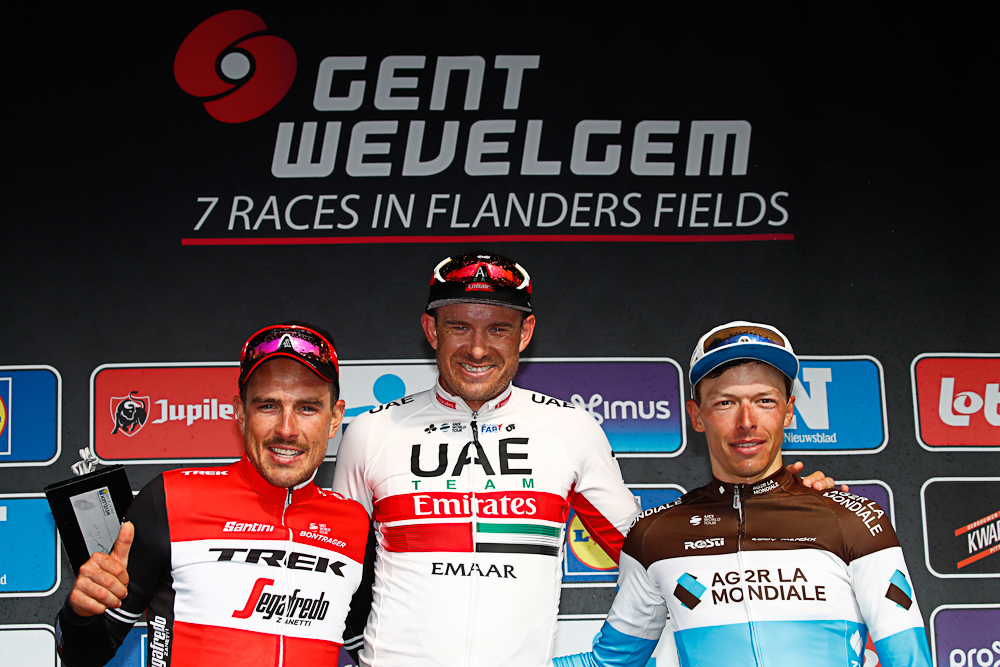
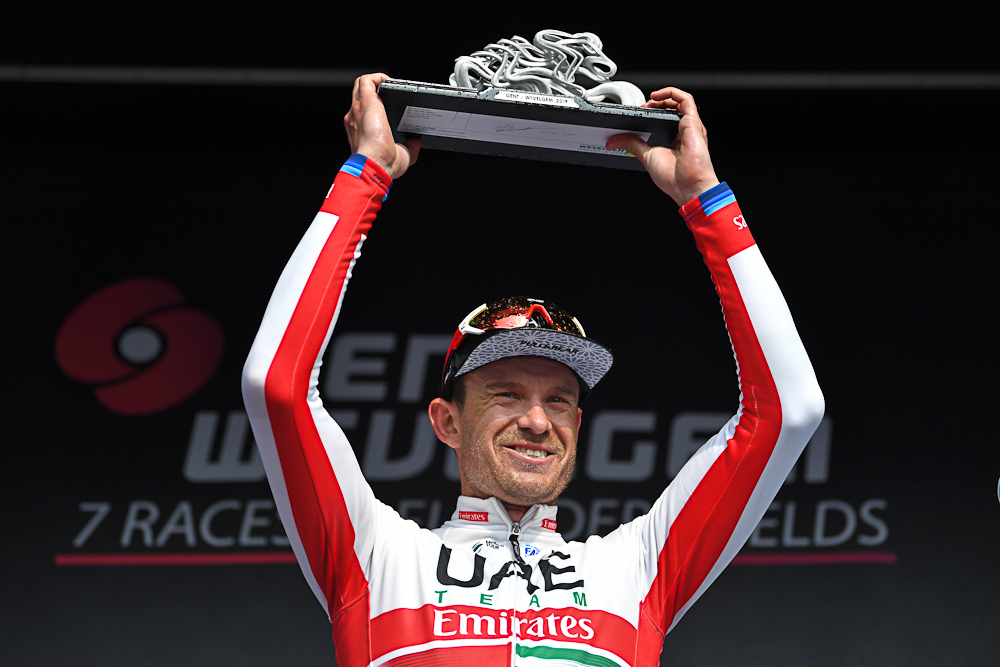
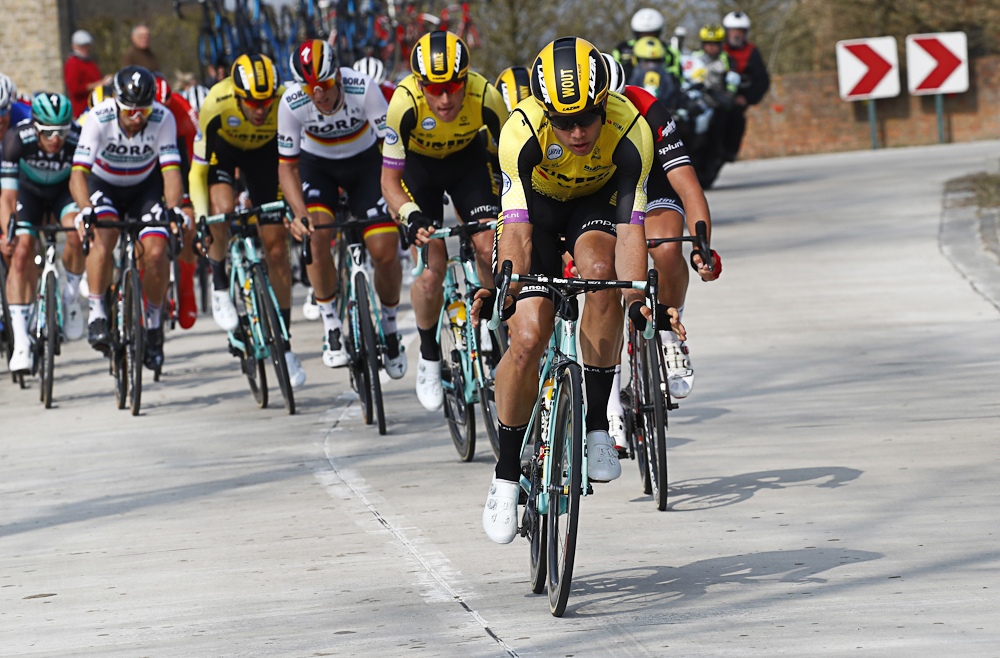
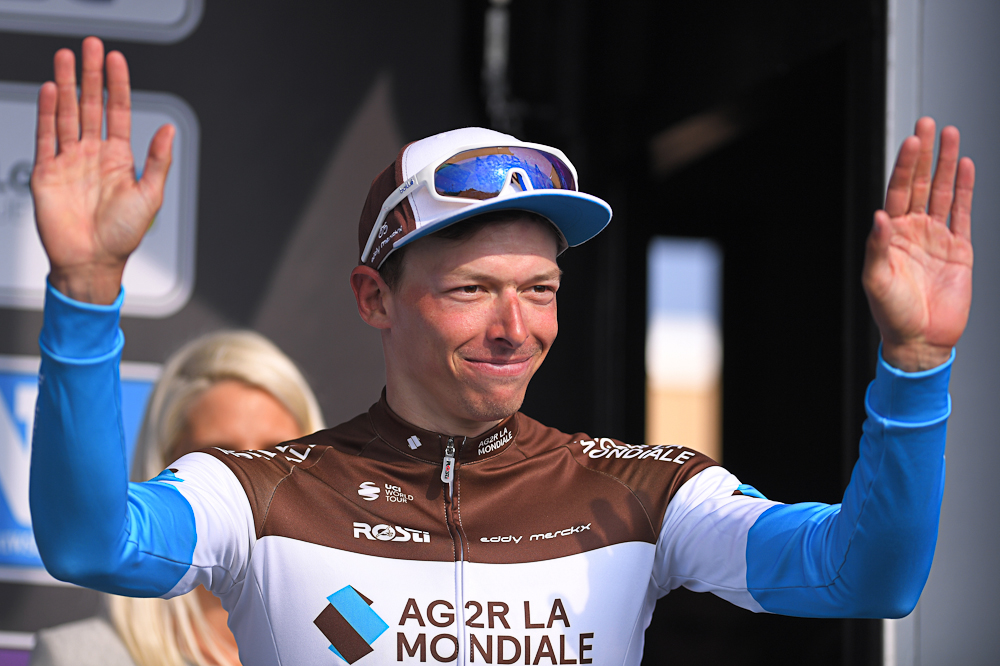
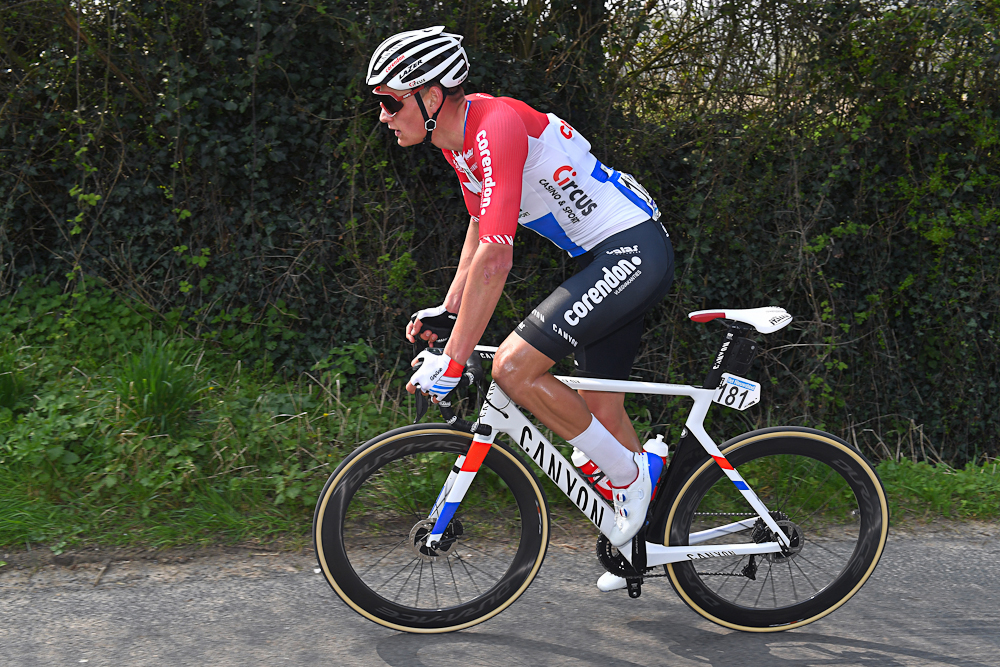
Tom Boonen once called Gent-Wevelgem a crap race – well, it was a much less polite four-letter moniker – but this weekend’s offering was anything but with an action-packed 250 kilometres of racing.
It was a brutal race that averaged 46km/h, where Alexander Kristoff (UAE Team Emirates) played a tactical blinder and had the legs to take victory in the sprint finish. Kristoff’s win spelt the end, or at least a brief hiatus, to Deceuninck-QuickStep’s domination of the one-day spring races. The Belgian team has been seemingly unbeatable at the start of this season, but they failed to even make the top 10 on this occasion.
A week before the Tour of Flanders, the race also saw impressive showings from Trek-Segafredo and Jumbo-Visma. These were just a few of the stories that came out of Sunday’s Gent-Wevelgem.
All-out action, Jumbo-Visma and Trek-Segafredo take the fight to Deceuninck-QuickStep
The post-race media scrums at one-day races had become almost formulaic in nature. More often than not, a Deceuninck-QuickStep rider would be ushered to the podium, mobbed by his teammates as he went, while directors from rival teams would wearily drag themselves from their cars. Another tiring day, another finish line that would ultimately lead to defeat. One almost felt sorry for these middle-aged men as they cleared the glove compartments of empty sweet wrappers, dusted off baguette crumbs, and searched for excuses. In almost every case the question would be asked: 'So how do you beat QuickStep?" And every time the answer would be the same: "Don't wait. Go early."
On Sunday we finally saw what happens when such a plan is put in place. For the first time this spring, Belgian's premiere team were on the back foot due to a 20-man break that contained blocks from Trek-Segafredo, Bora-Hansgrohe, Jumbo-Visma and a number of notable pre-race favourites.
The conditions certainly played a significant factor and while Deceuninck-QuickStep can look back on a day in which they made few mistakes, they certainly had the wrong rider in the break. Tim Declercq is no pushover, but he can neither climb like Zdenek Stybar nor sprint like Philippe Gilbert. So, while his presence in the attack meant that QuickStep had no onus to chase during the initial hours, they most certainly needed to hit the front once their breakaway rider was dropped on the Kemmelberg.
Even when Deceuninck-QuickStep were put on the defensive - as they were for most of Gent-Wevelgem - they still looked formidable. Gilbert, Stybar, and Yves Lampaert were instrumental in catching several moves and eventually setting up the sprint, while it should be noted that the Belgian team at times chose to ride defensively in order to set up Elia Viviani for the sprint.
Get The Leadout Newsletter
The latest race content, interviews, features, reviews and expert buying guides, direct to your inbox!
In the end, the Italian didn't have it. Boxed in, weakened from the all-out action, it matters little, but for the first time this spring, the other teams rolled the dice before Deceuninck-QuickStep could wrestle control. It made for the most exciting race of the Classics season so far. Flanders and Roubaix are entirely different beasts but there will be renewed confidence, both in the peloton and the team cars that follow.
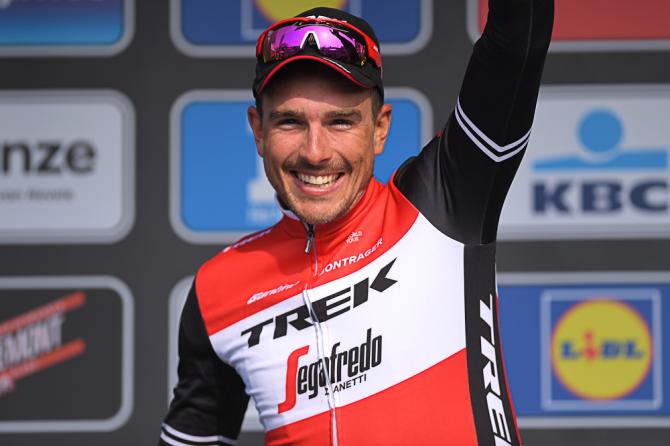
Trek-Segafredo's performance mattered more than their result
John Degenkolb's second place was an important result and just reward for a rider who is repeatedly asked to prove that he's back to his best. In a sense, Gent-Wevelgem epitomised his career in a microcosm - an impressive start in the break; a setback when he was dumped on the Kemmelberg; and then a gutsy ride to come back and take second place behind Kristoff.
Perhaps Degenkolb doesn't win as much as he could, or should, but what no one can question is his resolve or ability to come out swinging when he looks to be on the ropes. Perhaps that's why fans relate to him more than some other Monument winners. When Degenkolb suffers, cycling fans connect, and when he wins, or in this instance takes second, that jubilation touches those by the side of the road or on the sofa.
What's more, Trek-Segafredo as a team deserve praise. Not because they rode well - their Gent-Wevelgem ride should be the norm given the talent they have at their disposal - but because, like Degenkolb, they didn't throw in the towel after a bruising spring. In Gent-Wevelgem on Sunday Mads Pedersen looked like the rider who finished second at the Tour of Flanders last year; Jasper Stuyven was fresh at the end of a race, and Edward Theuns put in his best spring performance since possibly 2015.
Valgren struggles to hit his mark at Dimension Data
Six months ago, Michael Valgren was in Innsbruck, attacking at the World Championships, and threatening to ride away with the rainbow jersey. What have Dimension Data done with that rider? In that time the Dane has left Astana, but he looks unrecognisable to last year's model.
It's not just the Dane who has looked short of form: On Sunday the team failed to post a single rider in the top-50, and only one of their number made it to the finish. The E3 BinckBank Classic was almost, but not quite, as bad with one rider inside the top-60 and three finishers.
It's public knowledge that the team's Classics unit came down with illness in Algarve but since then they've shown no sign recovery. The Tour of Flanders is in a week, and Paris-Roubaix a further seven days out. Time is running out for all but Valgren who has a proven record in the Ardennes.
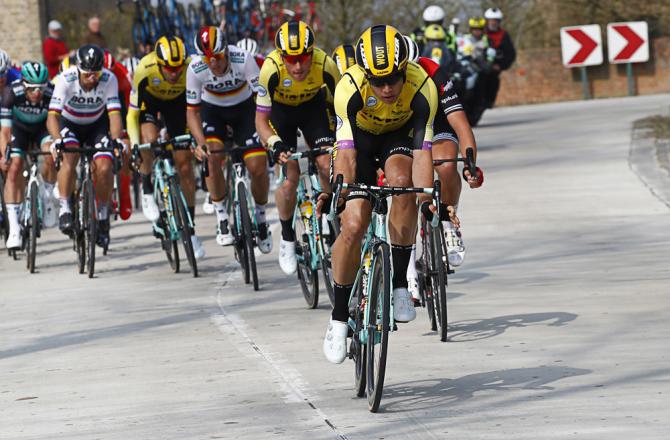
Jumbo-Visma's youth
Along with Trek-Segafredo, it was Jumbo-Visma who took the fight to Deceuninck-QuickStep with an aggressive plan and exceptional teamwork that almost scuttled Patrick Lefevere's fleet into the North Sea. The only difference between Jumbo-Visma and Trek-Segafredo was that the Dutch team lacked a sprinter to finish off their fine work, while bad luck also robbed them of two men in the early break when they initially had six of their seven riders on the offensive. A creditable fifth through Danny van Poppel perhaps wasn’t the reward their riding deserved.
However, the most exciting part of all this is that only one of the team's starting line-up in Gent-Wevelgem is over 30: their average age without Maarten Wynants comes in at a spritely 24.5 years of age. This is a team that's only going to get better with experience. The respected Dutch journalist Raymond Kerckhoffs hit the nail on the head last week when he wrote that the team's biggest challenge will be keeping their rankings intact over the coming years, but they must also be praised with their incredible recruitment and the improvements they've made in the last two seasons.
Alexander Kristoff's class
In November of last year, Alexander Kristoff sat down with the UAE management to talk about his future. After the team had signed Fernando Gaviria in the winter the conversation could have gone a number of ways. However, all parties concerned deserve credit after Sunday's win and the foundations for victory can be traced back to that winter meeting.
We'll start with the management, and highlight Allan Peiper, who has created an environment in which both Gaviria and Kristoff can both prosper. Peiper was quick to realise that dressing up Kristoff as purely a lead-out man was never going to work. The Norwegian couldn't give a flying Emirates 747 for holding such a role. Instead, Peiper set clear goals around certain races and has taken a step back and let Kristoff and Gaviria build a relationship within the team. It's led to a level of mutual respect and there's a clear impression that Gaviria knows he can learn from his vastly experienced teammate.
Both riders are at different phases of their careers, and their skillsets are not entirely overlapping, so when it comes to races like Gent-Wevelgem there is scope to adapt. This is where rider relations are so important. Gaviria could have demanded Kristoff's support in the finale - he was the designated sprinter at the start - but instead, he was honest with the men in the team car and explained he had nothing in the tank. That gave Kristoff the green-light. At that point, Gaviria could have sat up but instead, he played a pivotal role in sitting on Kristoff's wheel and not allowing rivals, including Elia Viviani the luxury of the Norwegian's slipstream. The move was key to final victory.
As for Kristoff, he remains one of the most underrated riders in the current peloton. It's true that following his Milan-San Remo and Flanders wins in 2014 and 2015, respectively, he failed to win another Monument, but to hold him to such high standards is somewhat unfair. The Norwegian has won as many Monuments as Peter Sagan, as many as Team Sky in their entire existence, and has taken 25 wins spanning 2016 to 2018. He may not be 'box-office' or do wheelies and hashtags, or whatever gets you noticed these days, but Kristoff is a thoroughbred and a classy bike rider. Hashtag that.
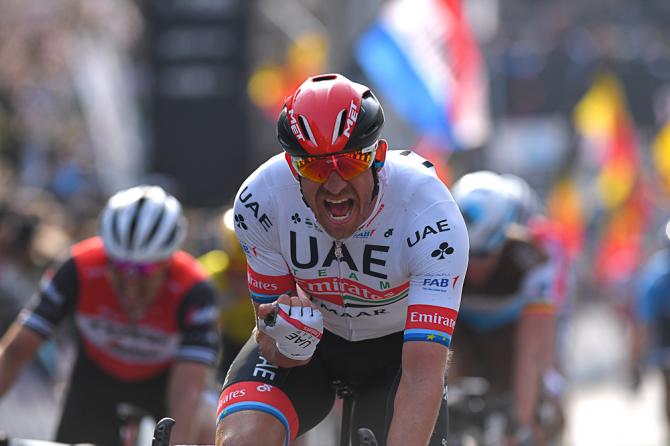
Weight matters
It's somewhat ironic that in the aftermath of Patrick Lefevere publicly calling a 19-year-old rider 'too fat' that Kristoff - a rider who has over the years faced questions over his weight - ended Deceuninck-QuickStep's run of one-day success. Lefevere has often been an out-spoken character but recently, starting with his comments relating to a woman that one of his riders objectified in Argentina, he has appeared out of touch.
As a team boss, Lefevere has every right to manage the condition and form of his riders but to publicly call a neo-pro 'too-fat' in the press is to completely disregard that rider's health and well-being. Whether that rider is 19 or 39 isn't really the most important issue either, but there are enough stigmas and pressures that modern athletes face these days without the undue publicity Lefevere has put on a young athlete's shoulders.
Next time, if your rider is overweight take him or her to one side in a mature manner that we know someone of your age and experience should be able to handle.
Naesen’s growing reputation
We were rightly criticised for not featuring the AG2R La Mondiale rider in our Milan-San Remo conclusions. The Belgian Oliver Naesen had just picked up his first Monument podium, and on Sunday he followed that up with third in Gent-Wevelgem.
Is he the most consistent Classics rider not to take a victory yet this spring? It seems only a matter of time before Naesen hits the jackpot, and only a matter of time before he finds himself in the right move and with the right riders he can beat in a sprint.
Van der Poel’s debut
Only Degenkolb made it into the early break and then finished higher than Mathieu Van der Poel in the sprint – a result that backs up all the excitement and hype surrounding the 24-year-old’s continued progression on the road.
On Sunday he not only infiltrated the early break but he threw in a stinging attack on the final climb that was nullified by none other than his ‘cross rival Wout van Aert.
His sprint showed that he still had gas in the tank, but he later admitted to making a couple of mistakes. There’s no shame in that, it was a chaotic finale in which far more experienced riders were found wanting.
Dwars door Vlaanderen and then the Tour of Flanders now beckon, and Van der Poel will no doubt play roles in both races.
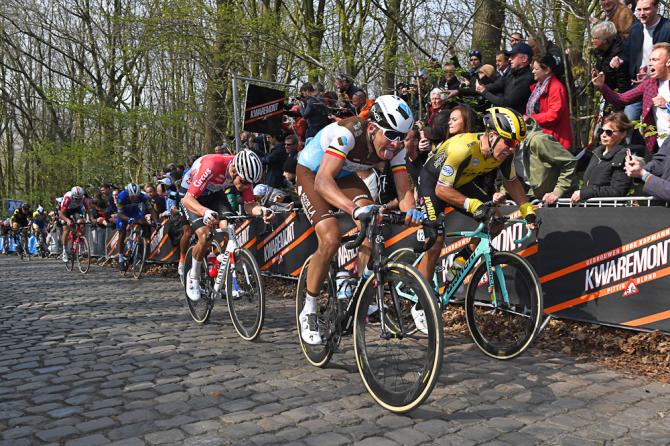
Daniel Benson was the Editor in Chief at Cyclingnews.com between 2008 and 2022. Based in the UK, he joined the Cyclingnews team in 2008 as the site's first UK-based Managing Editor. In that time, he reported on over a dozen editions of the Tour de France, several World Championships, the Tour Down Under, Spring Classics, and the London 2012 Olympic Games. With the help of the excellent editorial team, he ran the coverage on Cyclingnews and has interviewed leading figures in the sport including UCI Presidents and Tour de France winners.
